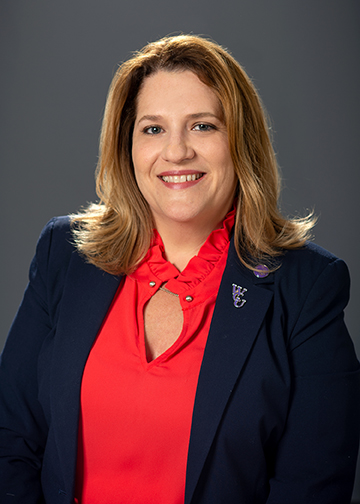Rowing in the Same Direction

With the recent establishment of an endowed professorship in early literacy, Western Carolina University is at the forefront of statewide efforts to improve the reading and writing skills of students in elementary grades, a top priority of the University of North Carolina Board of Governors.
WCU announced in March 2023 the Goodnight Distinguished Professorship in Early Literacy, made possible by a $1.5 million gift from the Goodnight Educational Foundation, with a pending $1 million UNC System match. The distinguished professor joins seven others across the state to provide a network of expertise and advance the UNC System’s early literacy initiatives through outreach and sharing best practices.
The WCU Board of Trustees in July approved the appointment of Denise Morgan, director of the Reading and Writing Center and professor of literacy education at Kent State University, as the inaugural Goodnight Distinguished Professor of Early Literacy effective Jan. 1.
The professorship is the latest example of WCU’s efforts to increase reading and writing achievement, said Kim Winter, College of Education and Allied Professions dean. “Our college has been heavily involved in early literacy since 2017 and our faculty and programs are deeply committed to and passionate about the preparation of teachers. This generous gift will enable us to take our efforts in early literacy to an even higher level,” Winter said.

WCU’s teacher education program was recognized in June by the National Council on Teacher Quality as among the best in the nation in preparing future elementary teachers to teach children to read, earning an A+ distinction from NCTQ. The program is among just 48 nationwide and five in North Carolina highlighted by NCTQ for going above and beyond the standards set by literacy experts for coverage of the most effective methods of reading instruction.
In 2020, the UNC System appointed eight faculty members — including WCU’s Roya Qualls Scales, professor of literacy education — as “Literacy Fellows.” Their charge was to investigate current research on the essentials of teaching reading and writing and to determine what UNC System educator preparation program graduates should be able to do when they begin teaching in elementary schools.
From that work arose a comprehensive framework and common guidelines to be used by all UNC System programs, adopted by the UNC Board of Governors and codified into law by the General Assembly in 2021.
Waynesville resident Katie Sanders ’21, who recently began her second full year of teaching fourth grade at Junaluska Elementary School in Haywood County, said she is glad to see the state focusing on improving early literacy skills to help fill gaps in learning from COVID’s interruptions.
“We are seeing a mixture of prepared and ill-prepared students coming into the elementary level because of differences in students’ home lives,” said Sanders, an elementary education major who received the 2021 Outstanding Prospective Teacher Award.
Zoe Mehdi ’23, an elementary education graduate from Charlotte who received the 2023 Outstanding Prospective Teacher Award, said she is eager to put what she has learned to use in her new job teaching fifth-graders at Joe P. Eblen Intermediate School in Asheville — and to serve as an exemplar for people of color in the teaching of reading and writing.
“There is a huge lack of minority teachers in the teaching profession,” said Mehdi, an Indian American. “As a person of color, I have found how important it is for me to be in this role. I’ve had students tell me, ‘You are the first teacher to ever look like me.’ One thing I love about the CEAP is the intention to create a diverse environment. We were taught how we can implement a library in our own classroom that is filled with a variety of texts that would greatly affect different types of learners.”
Donor-supported scholarships play a part in helping future teachers who come through WCU. With a seven-figure increase in CEAP’s scholarship endowments, the amount of financial support provided to the colleges’ students in the form of scholarships increased by 100% over the past six years, from $152,000 in 2017 to $305,000 in 2023. Ninety percent of those dollars go toward teacher preparation, with many scholarships in the elementary, inclusive and English education programs, all of which prepare literacy teachers.
For example, the Jackson County Teachers Scholarship, established to celebrate the 2019 retirement of mathematics teacher Rochelle Mau, provides annual support to students pursuing degrees in education, with preference to those from Jackson County.
“Many people think reading and literacy is the responsibility of language arts teachers but, as a math teacher, I also had to teach students how to read and solve word problems,” Mau said. “Literacy is in every aspect of life, and it's our responsibility to arm students with the best tools to be successful in and out of the classroom.”
CEAP is not the only unit at WCU working to improve early literacy. In the College of Health and Human Sciences, the Speech and Hearing Clinic is expanding its summer reading program through grants from the N.C. Scottish Rite Masonic Foundation. Camp LEAD (Language/Literacy Engagement And Development) is a four-week program that supports school-age children with speech, language or reading impairments in an effort to reverse the “summer reading slump.”
Educational leaders across the state and elected officials on both sides of the aisle agree that increasing efforts to improve the teaching of literacy at WCU and other institutions is critical.
“We’ve got to do more to ensure that graduates of our teacher preparation programs are prepared, on day one, to help more students learn to read,” said UNC System President Peter Hahns. “That’s why I am so encouraged by the work that is underway across the state to improve teacher preparation for early literacy — in our system, at the General Assembly, at the Department of Public Instruction and at the N.C. Community College System. It’s a beautiful thing when we are all rowing in the same direction.”

